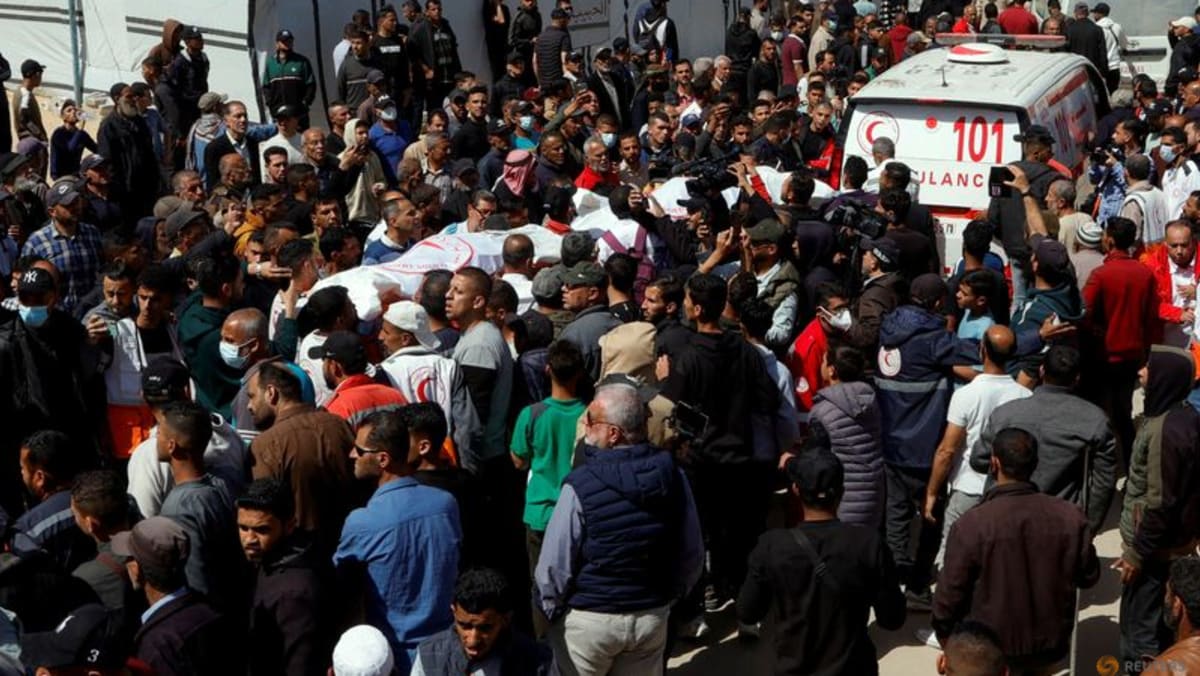The announcement by the IDF came ahead of a speech by President Biden, which outlined an Israeli proposal for a three-part cease-fire and hostage release deal. Biden described the plan as an opportunity for Hamas and Israel to “forge a better future out of the tragic terror attack and war.”
The first phase, he said, would entail the withdrawal of Israeli forces from “all populated areas of Gaza,” the exchange of certain hostages held by Hamas for “hundreds” of Palestinian prisoners in Israel and a “surge” of humanitarian assistance into Gaza. A cease-fire would span the duration of the first phase, Biden said.
Residents who returned to Jabalya spoke of the camp’s “complete destruction” after the 20-day operation. Once a refugee camp for Palestinians displaced by the 1948 creation of Israel, Jabalya camp turned into a densely populated neighborhood of concrete buildings in the subsequent decades.
GET CAUGHT UP
Summarized stories to quickly stay informed
Abdul Hadi Rayan, 42, ventured into Jabalya to inspect his home only to face devastation. “I did not know where my house was or where its borders were. The area has no house suitable for living at all,” he lamented.
Speaking to The Washington Post by phone, Rayan expressed uncertainty about his future. “Even if I decide to return to the camp and live in a tent, all the infrastructure, all the streets and water lines are destroyed. There is absolutely no place for life here now.”
Gaza Civil Defense spokesman Mahmoud Bassal reported that crews have been tirelessly working in Jabalya since the early morning hours. “Complete destruction in the camp, in every sense of the word. Nothing remains inside the camp,” he said.
He estimated that more than 1,000 homes were destroyed, but said the extent of the destruction remains unclear, compounded by disrupted communication and telephone services, as well as the challenge of removing rubble without adequate machinery.
Samir Salem, 49, who accompanied his wife to the camp Friday morning in hopes of finding their house, described the scene as a catastrophic “tsunami” of destruction.
“What happened, in short, is the complete destruction of Jabalya Camp. There is no longer a place that can be called Jabalya Camp. We are in an area that only smells of death.”
Israel’s operations in Jabalya were among a number of recent pushes its forces have made to “re-clear” areas of Hamas militants, who regrouped after initial IDF forays into neighborhoods.
While Israeli Prime Minister Benjamin Netanyahu has repeatedly framed the offensive on the southern city of Rafah as a final battle against Hamas, troops are returning to previous battlegrounds as Israeli operations in Gaza slow to a long battle of attrition, as The Post reported this month.
Israel’s national security adviser Tzachi Hanegbi said this week that destroying Hamas and other militant groups in Gaza will take “another seven months.”
Separately, the International Federation of Red Cross and Red Crescent Societies said Thursday that attacks on aid workers “must stop,” after two Palestine Red Crescent Society paramedics were killed west of Rafah this week. In a statement, the federation wrote that 24 members of its staff and volunteers have been killed since the war began: 20 from the PRCS and four from the Israeli Magen David Adom.
International medical charity Doctors Without Borders (MSF) said Thursday that Israel’s offensive in Rafah forced the closure of a primary care center in Mawasi, a tent encampment along the Gazan coast where many displaced Palestinians have fled since Israel launched operations in Rafah in early May. Gazan health officials this week said at least 21 people were killed and 64 injured in an Israeli attack on Mawasi.
“This is the second health facility we have been forced to close this week and another step in Israel’s systematic dismantling of Gaza’s health system,” the charity wrote on social media Thursday. It added that it has been forced to leave 14 medical facilities in Gaza since October.
“More than a million people have been forced to flee the Rafah offensive,” MSF said. “As long as this offensive and the larger war continues, medical services and essential aid will diminish, and more civilians will die.”
Secretary of State Antony Blinken said the distribution of aid within Gaza was “not working effectively” and that Israel’s offensive in southern Gaza was partially to blame. “In addition, Rafah gate continues to be closed,” he said, speaking at a NATO gathering Friday in Prague.
He said that while the number of aid trucks entering Gaza has risen significantly, the amount of aid getting into the hands of Gazans who need it was “insufficient.” Asked by a reporter why the United States wasn’t using its military aid as leverage, Blinken said the United States was “working on” fixing the conditions on the ground that were impeding the distribution of aid.
President Biden said Friday that the final stage of Israel’s latest proposal to Hamas included “a major reconstruction plan for Gaza.” Biden said that the U.S. would work with partners in the region “to rebuild homes, schools and hospitals in Gaza to help repair communities that were destroyed in the chaos of war.” The plan, he added, offered security for Israel as well as “self-determination” and “dignity” for the Palestinian people. Biden called on Israeli leaders to ignore radical elements in the government that sought to draw out the war, and urged Hamas to take the deal.
Hamas responded positively to Biden’s speech Friday. Hamas said in a statement that it was ready “to deal positively and constructively” with the proposal, provided that Israel was also seriously committed to negotiating a deal. Hamas said the latest offer came as a result of the “legendary steadfastness of our struggling people and their valiant resistance.”
Top congressional leaders announced Friday that they had invited Israeli Prime Minister Benjamin Netanyahu to address a joint meeting of Congress. The invitation, signed by top Democrats and Republicans in the House and Senate, expresses solidarity with Israel and mentions the “existential challenges” posed by Iran, Russia and China. “We invite you to share the Israeli government’s vision for defending democracy, combatting terror, and establishing a just and lasting peace in the region,” the letter says.
Hamas on Friday released a video featuring drawings and a voice-over from a female hostage. The hostage was not identified in the video but was confirmed in a statement by her family to be Noa Argamani, who was abducted from the Nova music festival on Oct. 7. Her family said they believed the drawings were made by Argamani, whose face was not shown in the video.
China said Friday that it is pushing for a cease-fire in Gaza, as it accused the United States of “double standards.” Speaking after a meeting between the U.S. and Chinese defense ministers, Chinese spokesman Wu Qian said “the increasingly grave humanitarian disaster [in the region] has caused indignation among people all around the world.” Beijing hopes that the United States “can live up to its responsibility as a major power [and] abandon double standards,” he said.
U.S. and British strikes on Yemen’s Hodeidah province killed at least 16 people and injured 35 others, the Houthi-controlled al-Masirah channel reported early Friday. The U.S. Central Command said Thursday it carried out the strikes with British forces on 13 Houthi sites that “presented a threat to U.S. and coalition forces and merchant vessels in the region.” The two countries launched a series of strikes on the Iranian-backed Houthi movement in January, after the group carried out months of attacks on Red Sea shipping in response to the war in Gaza.
At least 36,224 people have been killed and 81,777 injured in Gaza since the war began, said the Gaza Health Ministry, which does not distinguish between civilians and combatants but says the majority of the dead are women and children. Israel estimates that about 1,200 people were killed in Hamas’s Oct. 7 attack, including more than 300 soldiers, and it says 293 soldiers have been killed since the launch of its military operations in Gaza.
Kareem Fahim and Alon Rom contributed to this report.




















Discussion about this post